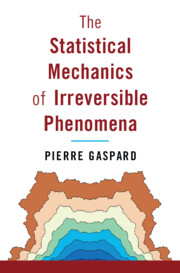Book contents
- Frontmatter
- Dedication
- Contents
- Preface
- 1 Thermodynamics
- 2 Statistical Mechanics
- 3 Hydrodynamics
- 4 Stochastic Processes
- 5 Fluctuation Relations for Energy and Particle Fluxes
- 6 Path Probabilities, Temporal Disorder, and Irreversibility
- 7 Driven Brownian Particles and Related Systems
- 8 Effusion Processes
- 9 Processes in Dilute and Rarefied Gases
- 10 Fluctuating Chemohydrodynamics
- 11 Reactions
- 12 Active Processes
- 13 Transport in Hamiltonian Dynamical Models
- 14 Quantum Statistical Mechanics
- 15 Transport in Open Quantum Systems
- Appendix A Complements on Thermodynamics
- Appendix B Complements on Dynamical Systems Theory
- Appendix C Complements on Statistical Mechanics
- Appendix D Complements on Hydrodynamics
- Appendix E Complements on Stochastic Processes
- Appendix F Complements on Fluctuation Relations
- References
- Index
1 - Thermodynamics
Published online by Cambridge University Press: 14 July 2022
- Frontmatter
- Dedication
- Contents
- Preface
- 1 Thermodynamics
- 2 Statistical Mechanics
- 3 Hydrodynamics
- 4 Stochastic Processes
- 5 Fluctuation Relations for Energy and Particle Fluxes
- 6 Path Probabilities, Temporal Disorder, and Irreversibility
- 7 Driven Brownian Particles and Related Systems
- 8 Effusion Processes
- 9 Processes in Dilute and Rarefied Gases
- 10 Fluctuating Chemohydrodynamics
- 11 Reactions
- 12 Active Processes
- 13 Transport in Hamiltonian Dynamical Models
- 14 Quantum Statistical Mechanics
- 15 Transport in Open Quantum Systems
- Appendix A Complements on Thermodynamics
- Appendix B Complements on Dynamical Systems Theory
- Appendix C Complements on Statistical Mechanics
- Appendix D Complements on Hydrodynamics
- Appendix E Complements on Stochastic Processes
- Appendix F Complements on Fluctuation Relations
- References
- Index
Summary
At the macroscale, thermodynamics rules the balances of energy and entropy. In nonisolated systems, the entropy changes due to the contributions from the internal entropy production, which is always nonnegative according to the second law, and the exchange of entropy with the environment. The entropy production is equal to zero at equilibrium and positive out of equilibrium. Thermodynamics can be formulated either locally for continuous media or globally for systems in contact with several reservoirs. Accordingly, the entropy production is expressed in terms of either the local or the global affinities and currents, the affinities being the thermodynamic forces driving the system away from equilibrium. Depending on the boundary and initial conditions, the system can undergo relaxation towards equilibrium or nonequilibrium stationary or time-dependent macrostates. As examples, thermodynamics is applied to diffusion, electric circuits, reaction networks, and engines.
- Type
- Chapter
- Information
- The Statistical Mechanics of Irreversible Phenomena , pp. 1 - 40Publisher: Cambridge University PressPrint publication year: 2022

